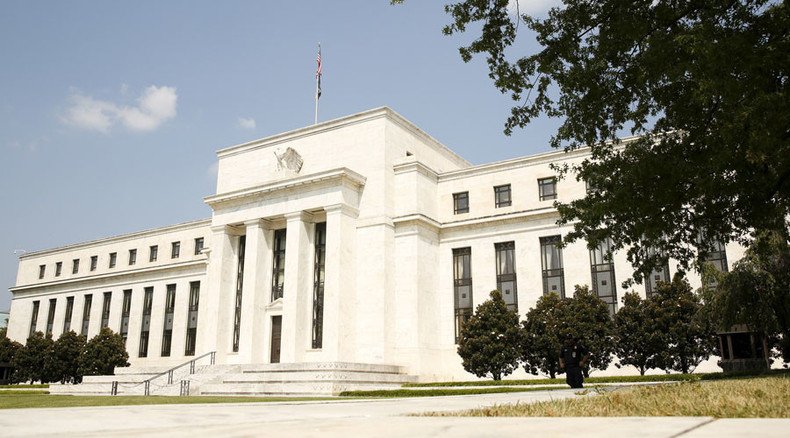How the Federal Reserve System feeds shopping frenzy

We all shop. There are necessities we must buy in order to live. Yet how many of us have taken the time to understand exactly what is fueling the obsession behind this time-consuming pastime?
Most of us would agree that shopping is necessary. It’s not like heroin use. People get through their entire lives without ever using heroin. You don’t need a little bit of it to survive. Shopping is more like food: you absolutely need some to be a viable human being.
The question is only about degree.
We are wedded to the idea of economic growth. Obviously, we need to produce something, but why is it so important that it be more than last year? If we had enough last year, why would it be so wrong to have enough this year as well?
The answer lies in the nature of our economic system.
Money is fiat. This means that rather than our medium of exchange being anchored to something of value, it is anchored to nothing.
In the US, currency is created by means of a deceit practiced between the Federal Reserve and the government. This procedure has some smoke, mirrors and complicated-sounding terminology attached to it, but the core mechanism is quite simple.
READ MORE: Global stocks slide on Fed uncertainty
In layman’s terms: the US borrows worthless currency into existence and then its citizens give real labor, goods and services in exchange for that worthless currency.
Since this scam creates debt, and debt incurs interest, there has to be ‘growth’.
To return to the heroin motif: the whole system is like a junky chasing a fix. When it gets one, it feels about as good as a normal person would feel without one.
But then it needs another.

A history of indebtedness
In the Middle Ages, usury in Europe was not only a crime, it was unnatural, and Dante placed usurers in the same circle of hell as the inhabitants of Sodom and other practisers of what he and everyone else at the time considered an unnatural vice.
Whatever modern morals would make of Dante’s broader perspective, the fact is that fiat currencies collapse. The median life of a fiat currency is 37 years.
The US dollar has been fully fiat since 1971, which is when it lost any relationship with gold. This is now 44 years ago. But before we claim US exceptionalism over the physics of money, we should consider Voltaire who left no room for doubt: “Paper money eventually returns to its intrinsic value – zero.”
Thus, the system we have at present combines fiat and usury, both historically regarded as evil. And it is the acceptance of such a system of economics that, in my opinion, is the primary root of most evil in the world.
Politics part of the problem
There is no shortage of people who claim to know what is wrong with the world, and some of them put themselves forward as the righters of those wrongs. We see a lot of them around election time. I gave up listening to anything other than actions years ago, so I don’t vote. I see no point in endorsing the simulation of choice.
But once the elections are over, I assess the characters and intentions of those the media will be calling our leaders for the next few years.
READ MORE: Russia becomes fashion victim as 20% sales slump hits global brands
I have a simple test, one which helps me effortlessly identify all those would-be leaders who are either too compromised or too ignorant to have merited the support I didn’t give them: I wait for the winners to identify correctly the central problem mentioned above – that of a fiat currency and the usurious system of economics – at any point after taking office, and then do something about it. Once they do that I am willing to take them seriously.
I can count the prominent pubic representatives in English-speaking countries who robustly acknowledge this core problem on the fingers of one hand – and still have enough fingers left to hold my tea.
Andrew Jackson famously said, “If the American people ever allow private banks to control the issue of their currency, first by inflation, then by deflation, the banks […] will deprive the people of all property until their children wake-up homeless on the continent their fathers conquered […]”
The US was fully conquered by the banking establishment by means of the Federal Reserve Act of 1913. Jackson would have turned in his grave.
The post-1913 US economic model is replicated almost everywhere today. Those few countries which held out have either recently been destroyed by NATO, are in the process of being destroyed by NATO, or will – one must assume – shortly be destroyed by NATO.
Not having a central bank seems to be the primary qualification for identification as a member of the ludicrously named Axis of Evil.
We – the Axis of Fluffy Goodness – have got things right. We create debt and spend it into existence and hand over our real goods and assets and labor – and pay interest for the privilege.
This is the system those we elect operate within. They take on huge debt while they are in government – which is exactly what the international banking establishment wants them to do – and put us on the hook for it, rather than solve the problem by issuing debt-free money and linking it to something real.
Thus, the consumer materialism you and I experience in our daily lives is not just something crass and tasteless that has come out of nowhere. It is implicit in the economic system in which we live and have our being because the junky needs his fix.
Prior to the shift to consumerism, it is not that people did not want to acquire more stuff – human nature being what it is – but their wanting more stuff began from a different baseline.

Less is more - no more!
Average citizens in England in the 19th century, for example, would typically own a modest amount of stuff. They would have working clothes, their Sunday best, some books, some tools and some furniture. Depending on their station, they might have more or less of these things. But their expectations were informed by the same sort of considerations a soldier has with regard to his Army-issued kit: when a particular item becomes old or broken it needs to be mended or replaced. There is no expectation that he should buy items wildly outside the range he already has.
Today, we have been trained out of any conception of sufficiency. Shopping does not happen merely to replenish or to maintain a set of items one needs. It has become an end in its own right.
The transition of mindset among the population from frugality to profligacy was necessary to support an economic system which was moving in stages – beginning in 1913 in the US – from reality-based meat-and-potatoes economics to one where the bank owns everything and progress is measured in terms of how fast you can give it more.
This transition was assisted by modern magicians like Edward Bernays.
Bernays – a nephew of Freud – taught that men were ruled not by reason but by dark – often unrecognized – emotions. It was easier to sell a car or a shirt by linking it to a primal desire than by means of reason.
While a shirt might be made of the highest quality cotton on the market, it was easier to sell an idea of popularity (or success with women, or whatever it was) and link that idea to the shirt than it was to sell the argument that the shirt should be purchased on grounds of the quality of the cotton.
Populations, Bernays taught, could be managed though their base desires and persuaded to buy almost anything, from products it wouldn’t find the time to use to ideas it wouldn’t take the time to check.
The advent of movies and then television helped bolster the illusion and move it into overdrive. While not overtly promoting particular products, movies and TV sell a worldview, a set of conclusions and values, which the viewer is required to assume in order to identify with the chief characters.
While the stories appear to differ – and thousands of movies are released each year – the moral assumptions underpinning the worldview in them is tediously uniform. When was the last time you saw a movie in which the lead man refused to have sexual relations with the heroine until after they are married, for example?
I rest my case.
Prior to the consumerist and degenerate society which Bernays helped shape – and the levers of which he explained to captains of industry and politics – the general population was not obsessed with shopping.
The people still had religion. An awareness of the fleeting nature of this life and the permanence of the next kept attitudes to material things within a sobering context, at least for many.
But with the advent of consumerism and the promotion of an increasingly atheistic, hedonistic, and supposedly scientific worldview, faith in God was pushed out of the frame. In time, not only was there no broader context within which to regard material goods, the pursuit of stuff itself became the new faith.
The problem is not that capitalism is broken. The problem is that we are trying to operate a system in which the money itself is both fiat and usurious. It is the debt-based and usurious nature of our economics that tends towards the creation of the One Percent.
It is the reason why rain forests are felled and cash crops sold rather than used to feed the people who need them. And it is also the reason why you and I are encouraged to feel that we never have enough.
This keeps us working all week to spend our weekends worshipping at the new temples to Mammon: the shopping mall.
The statements, views and opinions expressed in this column are solely those of the author and do not necessarily represent those of RT.













